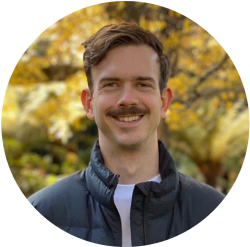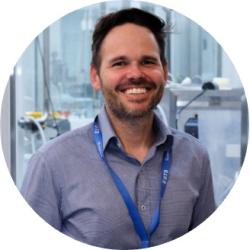
Meet the team
David Rickards
Biologics Innovation Facility Manager

David obtained a Bachelor of Biotechnology (Hons) from University of Technology Sydney and since then has 10 years’ experience in the R&D of monoclonal antibodies at Teva Pharmaceuticals as an Operational Scientist. In this role he has gained extensive knowledge in mammalian cell line development, biomanufacturing, and recombinant protein purification, in order to support various pre- to early stage clinical studies.
David joined the BIF in 2022 as the Facility Manager, bringing a strong foundation of operational management in the biomanufacturing space. In the role David has focussed on a strategic approach to business development, broadening key relationships with industry to support an expanded capability offering to the researchers and clients in Australia. Together with the team, David has implemented and achieved certification of an ISO 9001 quality management system, instilling quality in aspects of contract manufacturing, facility hire and training.
With his strong background in upstream and downstream biomanufacturing, David has led industry training on pilot-scale bioprocessing equipment and supporting the GMP Uplift introduction to GMP, including clean-room gowning, aseptic technique and facility operation. David is committed to providing an innovative learning experience and as such, supervises undergraduate student internships to develop hands-on biomanufacturing skills, creating industry ready graduates.
E-mail david.rickards@uts.edu.au Phone +61-295144775 Location CB04.06.3XX
Dr Andrew Care
Academic Director

Andrew is a Senior Lecturer in Biomanufacturing within the School of Life Sciences at UTS. His research innovatively combines synthetic biology and nanomedicine to re-engineer biologically-derived nanoparticles for drug delivery and vaccines. He holds a PhD in Chemistry and Biomolecular Sciences from Macquarie University and has previously held independent research fellowships - Cancer Institute NSW Early Career Fellowship and UTS Chancellor's Research Fellowship. Andrew engages actively with industry, was a Chief Investigator in the ARC ITRC IDEAL Hub, and received the UTS Vice-Chancellor’s Award for Research Excellence through Collaboration and Partnership for work with the hub.
Andrew's teaching and learning philosophy focusses on active student engagement, particularly through immersive research experiences. He has experience in whole curricula development as a Postgraduate Program Director in the Faculty of Science and has been recognized for incorporating a Work Integrated Learning (WIL) approach into his teaching. Andrew also established and coordinated UTS teams participating in the inter-university Australasian Synthetic Biology Challenge, leading to the creation of the science-meets-design magazine SYNTHESIS. Andrew’s ongoing commitment to quality higher education and innovative learning has earned him a UTS Vice-Chancellor’s T&L Citation and multiple UTS Faculty of Science Dean’s Awards.
As Academic Director of the Biologics Innovation Facility (BIF), Andrew is passionate about providing high-quality teaching and training to students and professionals, equipping them with advanced knowledge and hands-on skills for immediate entry into the rapidly expanding biomanufacturing sector.
E-mail: andrew.care@uts.edu.au Phone +61-295145738 Location CB04.06.323
Aabha Sahakari
Aabha Sahakari graduated with a Bachelor of Biomedical Science from Griffith University, Queensland, and has since gained valuable experience in the biopharmaceutical and cultured meat industries. At Thermo Fisher (formerly Patheon), she developed strong skills in large-scale media and buffer preparation, quality control (QC), and quality assurance (QA). Later, as a Manufacturing Associate at Vow, she focused on scaling up bioprocessing methods, building quality systems, and optimizing large-scale manufacturing processes.
In addition to her technical expertise, Aabha is passionate about training others. She has extensive experience teaching staff and students in cell culture, quality management, and bioprocessing within GMP environments, helping to ensure that teams are well-prepared for success in the industry.
Dr Chi Pham
Dr Chi Pham has a pharmacy background with advanced knowledge in Good Manufacturing Practice (GMP). She completed her PhD in Chemistry at the University of New South Wales (UNSW). During her PhD, she gained experience in recombinant protein expression; protein purification and characterisation including native mass spectrometry, LC/MS, functional bioassays.
Since joining the BIF in 2022, Chi has been involved in downstream processing including purification and analysis of biologics products. She established the facility’s environmental monitoring processes for cleanrooms ranging from Grade D to Grade B, including both viable and non-viable particle monitoring, and water testing. As a subject matter expert, Chi has developed training courses in regulatory components of environmental monitoring and technical aspects of downstream biomanufacturing, including chromatography, and fill and finish.
Chi provides valuable insights in biopharmaceutical development and analytical quality control for undergraduate students completing their internship at the BIF, and has supported the delivery of the MTP connect supported GMP uplift program.
Kristine Flores
Kristine Flores completed a Bachelor of Science majoring in Biology and Microbiology with Honours in Biology at the University of Sydney (USYD). Building up from experience in optimising growth conditions for numerous cyanobacteria species during her Honours research, Kristine has since developed extensive knowledge and skills in the biodiscovery and fermentation of a broad range of fungi and bacteria, in order to express a diverse array of small molecule compounds in her previous role at Microbial Screening Technologies.
Since joining BIF at the start of 2020, Kristine has been involved in the upstream bioprocessing of mammalian cell lines, particularly focusing on the expression of monoclonal antibodies through the transfection of cell cultures. Kristine has also led the development and implementation of the BIF’s Quality Management System (QMS) which aims to encompass training, contract manufacture and facility hire.
Additionally, by integrating experience-focused cell culture training and BIF’s unique cleanroom spaces, Kristine teaches undergraduate students in BIF’s internship program critical aseptic technique skills and core QMS knowledge, allowing students to foster desirable abilities for working in GMP spaces. By further implementing hands-on experience, Kristine has facilitated NIBRT accredited bioprocessing training courses and the delivery of the MTP connect supported GMP uplift program.
